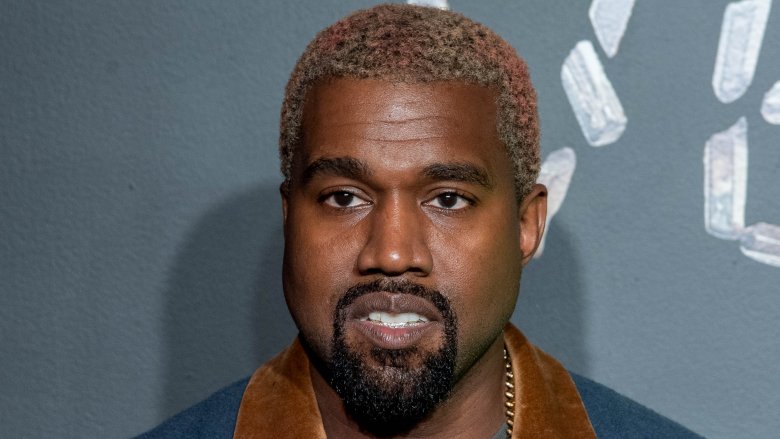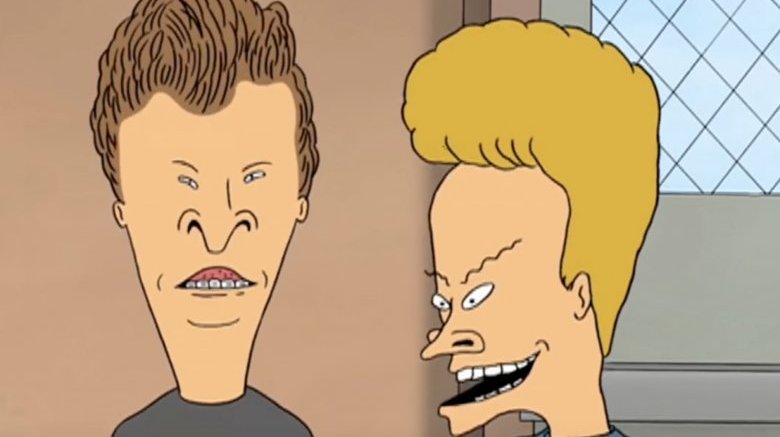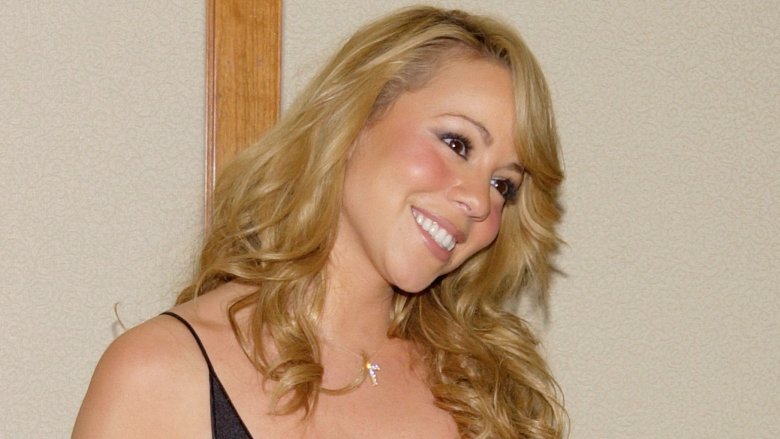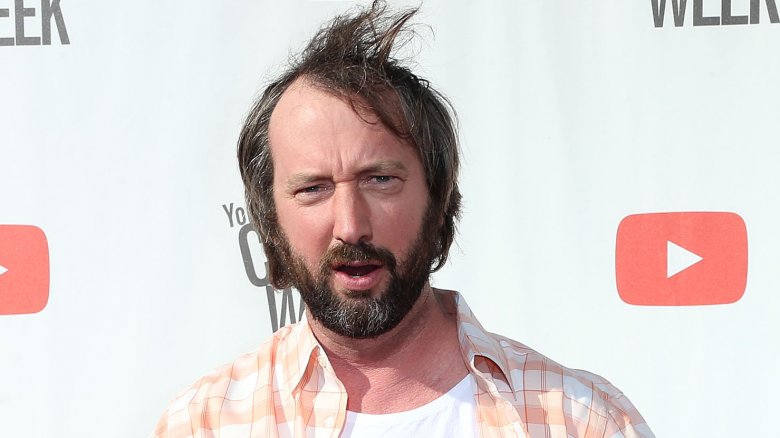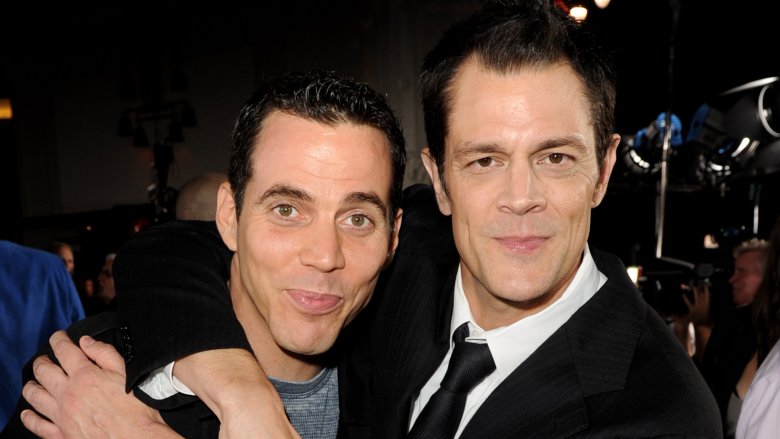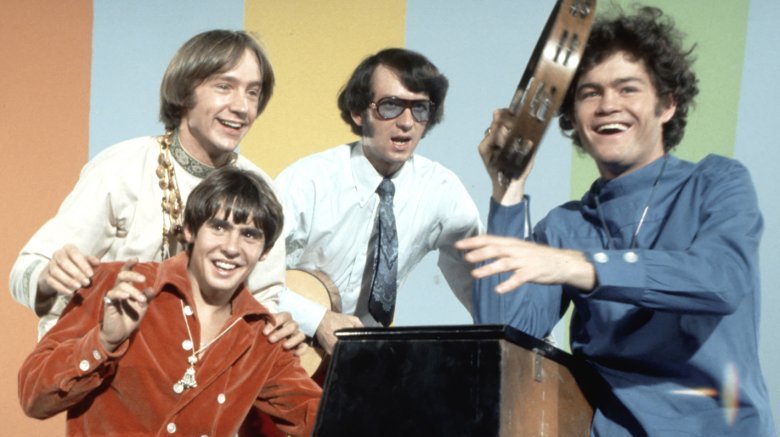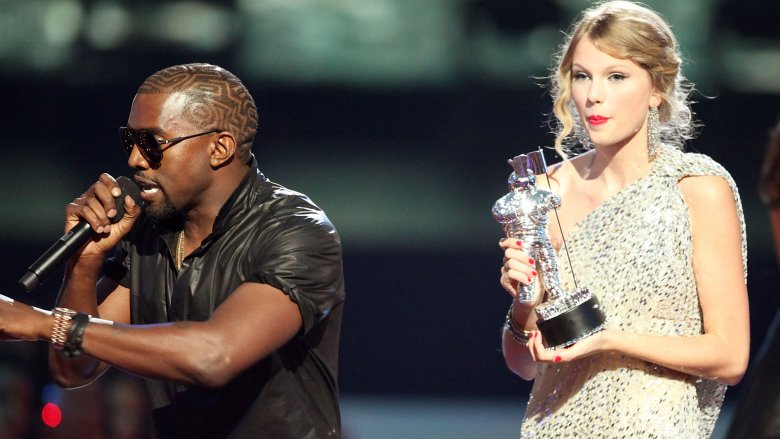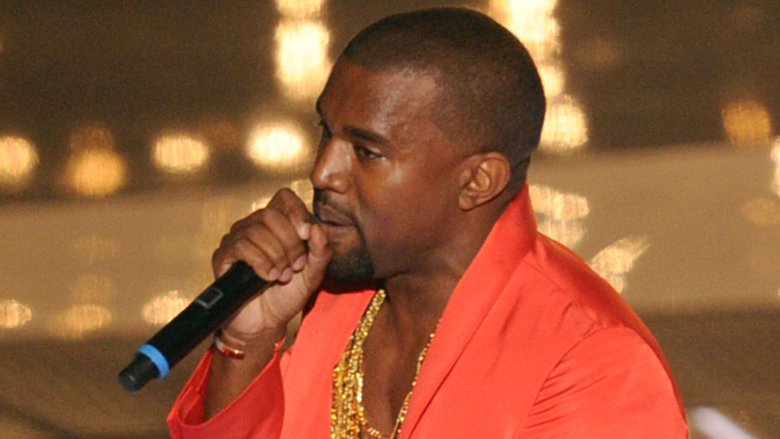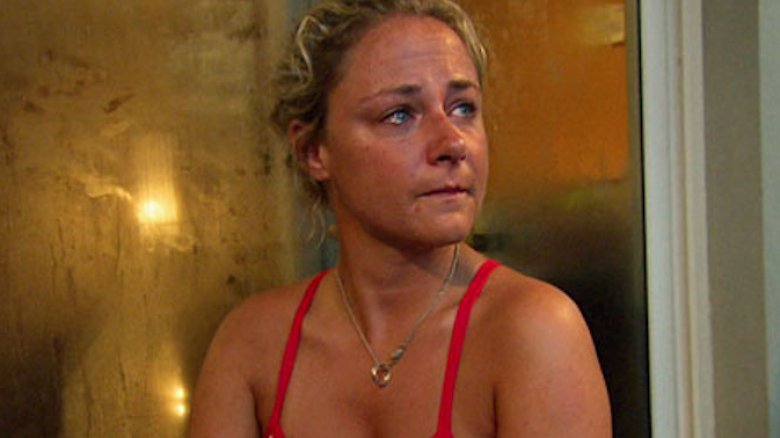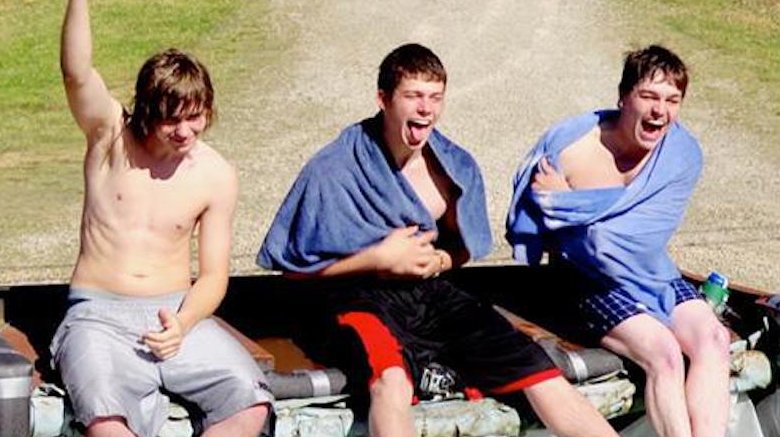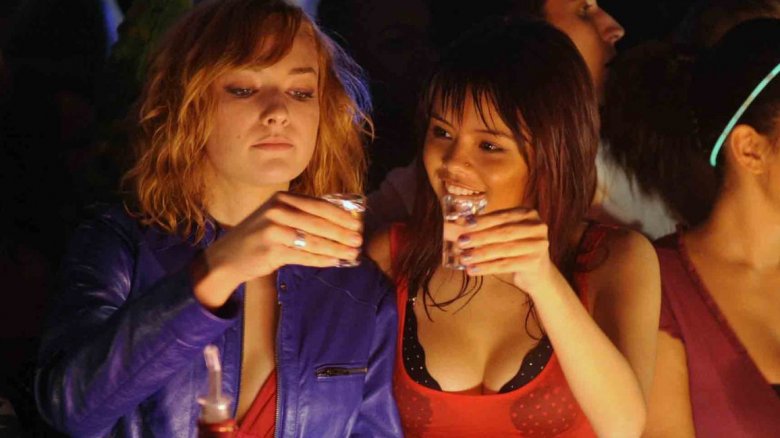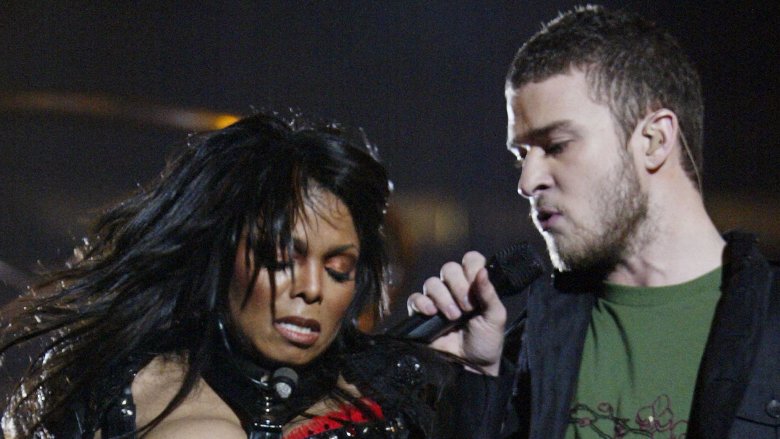The Biggest Scandals To Ever Hit MTV
Since its debut on cable systems in August 1981 — with some astronaut graphics and the Buggles clip for "Video Killed the Radio Star" — MTV (short for Music Television, once upon a time) has been affecting, changing, and creating pop culture, tastes, and trends. Some of the most important musical moments, television phenomena, and live moments of the past 30-odd years left an impression thanks to MTV beaming them out to millions of homes. For better or for worse, without MTV we wouldn't have had The Hills, Jersey Shore, Carson Daly, Daria, or even a-ha.
But while fortune favors the bold, MTV has caused just as many pearl-clutching scandals as it has indelible cultural milestones. Every so often, its brash, in-your-face, spirit-of-rock-'n'-roll approach has left some fallout, from ruined careers to behind-the-scenes shake-ups to death. Here are some of the most controversial moments and biggest scandals that ever happened to (or because of) VH1's cooler, older cousin.
Beavis and Butt-head and fire
MTV scored huge in 1993 with Mike Judge's Beavis & Butt-Head, a crudely animated series about two small-town metalheads who spend their time destroying property and making fun of music videos. In the words of Butt-head, the show "ruled" youth culture for a while ... until the troubled Beavis' love of burning stuff (He'd often flick a lighter and shout "Fire! Fire!") almost brought down the whole thing.
In October 1993, 5-year-old Austin Messner set his bed on fire with a lighter. The boy and his mother, Darcy Burke, escaped the blaze, but the boy's 2-year-old sister didn't and died. The mother, and local authorities, placed the blame on Beavis & Butt-head, and specifically, Beavis' pyromania. "When you take a child in the formative years and you get these cartoon characters saying it's fun to play with fire, this is going to stick in that kid's mind and it's going to be with him for a long time" local Fire Chief Harold Sigler told the Associated Press (via The New York Times).
MTV swiftly responded, cutting out all references to fire from completed episodes of Beavis & Butt-Head and banning them from appearing in future installments. It also eliminated the show's 7 p.m. weeknight airings, reducing the show to its 10:30 p.m. showing, thereby cutting down on the possibility that young, impressionable viewers may be watching.
But did anyone totally request a live striptease?
Anybody who was anybody in the giant corporate music machine in the early 2000s routinely stopped by MTV's TRL, but there was something off about Mariah Carey's spot on the show in July 2001. As host Carson Daly tried to go to commercial, Carey materialized on set, pushing an ice cream cart while dressed in an oversized T-shirt adorned with the word "Loverboy," the title of her latest single. Daly mentioned that Carey's appearance was "unannounced to me." Carey said she had a present for Daly: "It's this shirt." Then she took it off, revealing a tank top and hot pants. Daly seemingly remained confused as Carey said, "Every now and then somebody needs a little therapy. And today is that moment for me."
Then she remembered the ice cream. "This is a ice cream truck. See they had decorated this," she said, before instructing the camera crew to not zoom in too close on her "really short" shorts. Then she wandered over to a window, looked down at Times Square and said, "These are just some folks on the nice street." Carey announced that the "ice cream truck" was full of goodies for the studio audience, as what appeared to be a vaguely panicked Daly finally got to cut to commercial.
According to ABC News, Carey was subsequently hospitalized for exhaustion. In 2018, she revealed to People that she'd actually been diagnosed with bipolar disorder.
MTV giveth 'The Bum Bum Song' and MTV taketh away
In 1999, MTV took a chance on Canadian import The Tom Green Show, centered on the star's surreal and goofy confrontational comedy — such as painting pornography on his parents' car or riding a cow into a supermarket. In the summer of 1999, the market could apparently bear a Tom Green novelty rap song and video: "Lonely Swedish (The Bum Bum Song)." The gist: Green names things and rubs his "bum bum" on them. Green encouraged fans to vote for the video on MTV's other pop culture phenomenon of the moment, Total Request Live. Before long, his track sailed past TRL's familiar bevy of boy bands, Britney Spears, and rap rock to hit No. 1 on the countdown.
Even though this was a brilliant bit of MTV cross-promotion, the network eventually couldn't abide. "We got a call at the office. They said, 'Guys, we want you to play ball with us here," Green said on The Joe Rogan Experience. "We need you to go on the show and retire the song, take it off the countdown." Why? The following week's episodes of TRL had supposedly been taped in advance because host Carson Daly would be out, so the staff allegedly just ranked the videos the way they'd been going and hadn't accounted for the "spoiler effect" of "Lonely Swedish." Green claimed he "played ball" and retired the song, thus preserving the alleged TRL fix.
Welcome to Jackass, this is 'The Premature Cancelation'
Hitting MTV in late 2000, Jackass represented a thrilling, visceral kind of comedy rarely seen on mainstream TV. Johnny Knoxville and friends endured gross, clever, hilarious, and extraordinarily dangerous stunts. Its homemade, DIY aesthetic unfortunately meant that some viewers at home assumed that they, too, could pull off Jackass-style stunts. They could not. According to People, a 13-year-old Connecticut boy was hospitalized for second- and third-degree burns on his legs and hands after attempting to replicate Knoxville's self-explanatory "Human Barbecue" bit.
That was quite enough for Sen. Joe Lieberman, who called for an end to Jackass. "It is irresponsible for MTV to air these kinds of stunts on a program clearly popular with young teens," he said in a statement (via Entertainment Weekly). "There are some things that are so potentially dangerous and inciting, particularly to vulnerable children, that they should not be put on TV." In the wake of criticism by Lieberman and others, co-creator Spike Jonze said in Maxim's oral history of the series that "MTV got scared, so they pulled back on promoting the show, and it sort of took the steam out of it for us." The network also reportedly instituted a lot more health and safety measures, and the cast bristled. "I felt that we couldn't do a watered-down version of the show, so I quit," Knoxville said. After less than two years on the air, Jackass left MTV.
Hey, hey, where's The Monkees?
Decades before MTV offered both rock videos and irreverent behavior, viewers who wanted that delightful combination had The Monkees, the 1966-68 NBC sitcom starring a band of the same name. Assembled by a production company, The Monkees became a hugely popular band, scoring three No 1 hit singles, while the progressive, fourth-wall-breaking The Monkees show won an Emmy Award for outstanding comedy series. In 1985, the members of The Monkees began planning a small 20th anniversary reunion tour, which turned into a lucrative, extended affair after MTV added The Monkees reruns to its lineup and experienced a positive response. "We've never received such a volume of mail," MTV executive Tom Freston told Rolling Stone (via Monkees Live Almanac). "We were dumbfounded by the whole thing.
After The Monkees' "That Was Then, This Is Now," hit the top 20 — thanks to heavy MTV airplay — the band released a whole new album in 1987 called Pool It! The group made a video for the single "Heart and Soul," but MTV banned it. According to Monkee Business Fanzine, MTV management was under the impression that The Monkees would play on a televised Super Bowl special in January 1987. The Monkees, however, had been booked for another engagement and didn't show. The executive in charge of that special took such offense at the band's perceived slight that he allegedly banned "Heart and Soul" from rotation. That killed The Monkees' momentum, and both the song and video faltered.
Kanye is gonna let Taylor finish, but...
The MTV Video Music Awards is the channel's excuse to put on a huge party celebrating the year's biggest musical acts. Viewers can count on at least one daring and very rock n' roll thing going down each year, be it Madonna attempting to make a baby with the stage while singing "Like a Virgin" in 1984, or Michael Jackson awkwardly kissing his wife, Lisa Marie Presley, in 1995. But one moment will outlive them all — the one that demonstrated that the VMAs don't have the greatest security detail.
At the 2009 ceremony, Taylor Swift won best female video for "You Belong With Me" over Beyoncé's "Single Ladies." Swift took to the stage to deliver her acceptance speech, only to fall victim to the force of nature that is rapper Kanye West. Rather than act like a normal person and post an all-caps Twitter rant declaring his displeasure with the results, the rapper rushed the stage to express himself. "Yo, Taylor, I'm really happy for you, I'ma let you finish," he said, "but Beyoncé had one of the best videos of all time!" That was met with audible boos, stunned silence from Swift, and Beyoncé looking embarrassed. West indirectly apologized a couple of days later on The Jay Leno Show, but the two superstars have feuded off and on for years.
Kanye claims the VMAs are rigged
After his behavior at the 2009 Video Music Awards, it's surprising that MTV allowed Kanye West anywhere near the ceremony ever again. But he's a fixture at the show, and in 2016, he hit the stage as a presenter, debuted his video for "Fade," and received two nominations — "Famous" was up for best male video and video of the year. West lost in both categories, to Calvin Harris' "This Is What You Came For" and Beyoncé's "Formation," respectively. You'd think West would be pleased Beyoncé won a VMA, but not this time.
A couple months after the ceremony, West performed in Sacramento, Calif. in a show that ended prematurely after West engaged in what The Wrap called "a manic onstage rant" that lasted for 15 minutes. Among his many thoughts: He claimed that the VMAs were rigged, and that he knew in advance that "Formation" beat "Famous" (as well as Drake's "Hotline Bling.") "They told me beforehand so I wouldn't run on stage," West said. Then he drop another potential bombshell directed at Queen Bey. "Beyoncé, I was hurt because I heard that you said you wouldn't perform unless you won video of the year over me and over 'Hotline Bling.'" That's a big deal if it's true. Key word: if.
'Dude, This Sucks' wasn't just a clever title
In the early 2000s, MTV explored the line between entertainment and shock value with shows such as Ashton Kutcher's celebrity prank fest Punk'D, Jackass, the Jackass spin-off Viva La Bam, and an ill-fated 2001 project called Dude, This Sucks. As part of MTV's "Snowed In" slate of winter-themed programming, the show's pilot episode was taped at a ski resort in California's San Bernardino Mountains. Two local teens, Kelli Sloat and Monique Garcia, sat right by the stage ... and then later, they sat with their attorney when they sued over the events that transpired during filming.
"We were having a good time until the second act of Dude, This Sucks went on," Garcia said at a press conference (via E! News). That's when the "Shower Rangers" came out and did their thing. "All of a sudden I was smelling something disgusting and I started to gag. I looked around at my friends. They were covered in something. As I looked down at myself I realized that I was, too." That something was feces. The Shower Rangers' act consisted of mooning the crowd ... and then projecting their leavings.
"It was unintended and we regret that it happened," said MTV programming president Brian Graden in a statement, adding that the footage of the incident would never air — and it never did. (And Dude, This Sucks didn't get picked up to a full series.)
The network's callous response to an alleged assault
Tonya Cooley's first appearance on an MTV reality show was as a housemate on The Real World: Chicago in 2002. She then starred in eight different iterations of The Real World / Road Rules Challenge, the last being the 2009 Thailand-set The Ruins. In 2011, Cooley filed a lawsuit against Bunim/Murray Productions, MTV, and other parties on horrifying grounds: She alleged that she'd suffered repeated sexual abuse during her time in Thailand, including an assault while she was unconscious. According to The Hollywood Reporter, Cooley placed the blame on the production end, in part because it supplied contestants with a never-ending stream of alcohol.
MTV's corporate parent, Viacom, responded to the charges by claiming that Cooley hadn't logged her complaints about the show via the proper channels and by implying that Cooley was responsible for the negative outcomes she experienced. "Plaintiff failed to avoid the injuries of which she complains. For example, while she was a contestant on The Ruins, Plaintiff was frequently intoxicated (to an extent far greater than other contestants), rowdy, combative, flirtatious and on multiple occasions intentionally exposed her bare breasts and genitalia to other contestants." The parties ultimately settled the case out of court.
The Buckwild cast went Buckwild before Buckwild aired
Buckwild produced almost as many controversies as it did episodes. Something of a rural version of Jersey Shore, Buckwild followed the lives of some TV-ready young people in West Virginia as they did stuff like drink in the woods, throw a pool party in a dump truck, and hunt squirrels. Before the show debuted, West Virginia Sen. Joe Manchin said the show "plays to ugly, inaccurate stereotypes about the people of West Virginia." The West Virginia Film Office even denied MTV a lucrative tax credit to produce the show in the state, because it found the series "significantly derogatory." Nevertheless, MTV aired the series in early 2013.
A few days after the season finale aired, police arrested cast member Salwa Amin at a friend's house in West Virginia when, according to TMZ, authorities discovered heroin and unauthorized oxycodone. Charged with two counts of drug possession, Amin was arrested again after a court-ordered urine test delivered positive results for morphine and oxycodone. It gets worse.
According to CBS News, on April 2, 2013, Buckwild's Shain Gandee was found dead in his Ford Bronco, stranded in a mud pit in remote West Virginia. The car had reportedly gotten stuck with its tailpipe submerged under mud, leading to a fatal buildup of carbon monoxide in the vehicle. Eight days after Gandee's death, an MTV rep told TMZ that Buckwild was done.
MTV wasn't comfortable with the 'Skins' it was in
MTV's programming constantly evolves to attempt to remain in line with the hip young kids. in the early '90s, The Real World depicted disaffected Generation X-ers, and in the late '90s, TRL aired a constant stream of boy band videos — the network gives the masses what they want. In 2011, the network wanted to show "how teens live now" with Skins, a sex-and-drugs-filled soap about precocious high schoolers making salacious and dangerous life choices. It seemed like MTV would have a hit on its hands, in part because Skins was based on a popular British series of the same name.
America didn't much care for Skins. MTV launched its most costly ad campaign to date, and it paid off initially. The debut episode landed some of the best ratings for a new show that the network had seen. However, less than half of those 3.26 million viewers liked what they saw enough to tune in for Episode 2. MTV faced a far larger problem in that it couldn't keep or attract advertisers to Skins. After the media watchdog group Parents Television Council labeled the show (via Newsweek) "the most dangerous show for children that we have ever seen," a number of huge companies swore off buying ad space on the series, including Taco Bell, Schick, L'Oreal, and General Motors. After just one season, MTV canceled Skins.
Call MTV 'the self-censoring network' if you're nasty
Millions of Americans were apparently scandalized in February 2004, when they saw part of a woman's breast for part of a second. While performing at the Super Bowl XXXVIII halftime show, Justin Timberlake tore off part of Janet Jackson's clothing, revealing the singer's breast (or at least what wasn't covered by a nipple ornament). It became history's most notorious "wardrobe malfunction," and because MTV produced that halftime show, it apologized in a statement: "The tearing of Janet Jackson's costume was unrehearsed, unplanned, completely unintentional, and was inconsistent with assurances we had about the content of the performance."
Then the apology turned into self-punishment. About a week after the Super Bowl, MTV identified six popular music videos that it felt contained content of an edgy or sexual nature and consigned them to late-night play only. "We always take into account what the cultural environment is on an ongoing basis," an MTV spokesperson told Reuters (via CNN). "Given the particular sensitivity in the culture right now, we're erring on the side of caution for the immediate future." Among those clips deemed too risqué: Britney Spears' "Toxic," which features some sexy dancing and skimpy costumes, and Incubus' "Megalomaniac," a political screed with a video that features Adolf Hitler.

